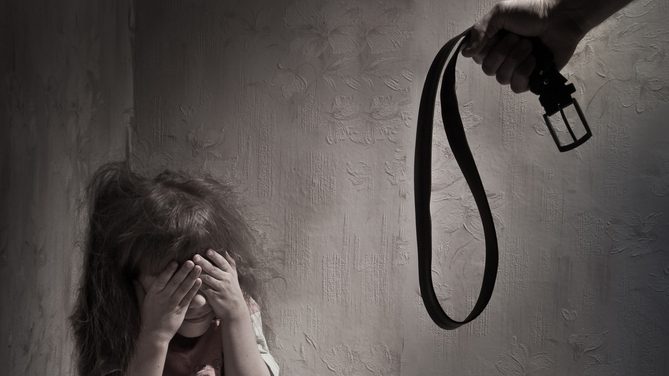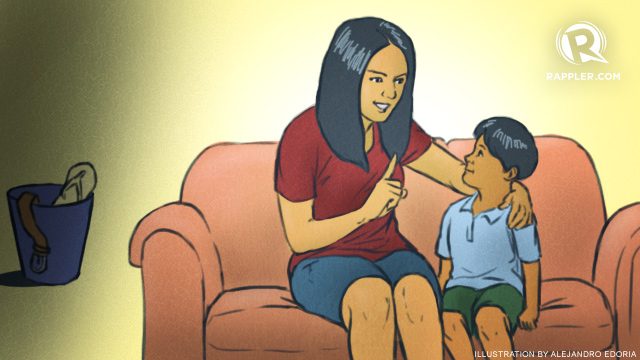SUMMARY
This is AI generated summarization, which may have errors. For context, always refer to the full article.

MANILA, Philippines – At first, she took the spanking and the pinches in silence.
This is discipline, she often told herself. She called the discipline “love” – the love of a mother who only wants her child to grow up well.
But the spanking and the pinches came frequently.
“Marami pong bugbog at saka palo saka sampal [mula kay] Mama. Tinadyakan pa po ako nun e (I was beaten, spanked, and slapped by Mama. She even kicked me),” Jenny* said with a laugh as she shared to Rappler the worst corporal punishment she has experienced.
“Nauntog po yung kapatid ko, ako po yung nasisi. Ewan ko po, [baka] pagod o kaya galit [si Mama] (My sibling hit her head, and I was blamed for it. I don’t know why, maybe Mama was tired or angry).”
Her father, Larry, said he and his wife always explained to the 14-year-old why they spanked her.
“‘Anong ginawa mo? Bakit ka napalo? Kasi mali ‘yung ginawa mo.’ ‘Pag makulit, sinasabihan mo siya na ayusin ‘yung gagawin. ‘Di naman pwedeng sasabihan ng sasabihan, tapos uulitin nang uulitin. ‘Pag nasaktan siya kahit kaunti, alam na niya, ‘di na niya uulitin ‘yun,” Larry told Rappler.
(‘What did you do wrong? Why were you spanked? Because what you did was wrong.’ When she’s not behaving well, we tell her to do things right. We can’t just keep reminding her, only for her to keep doing it again and again. When she gets hurt, even a little, she won’t do it again.)
Larry defended their choice of discipline. Speaking for himself, he said he never hurt Jenny to the point of wounding her. At most, he would just slap her palms.
Global movement
In 2014, Jenny learned about the growing advocacy for positive discipline in the Philippines. When she finally became a youth advocate, she tried convincing her parents to do away with corporal punishment when disciplining her.
“Sinasabi ko sa Mama at Papa ko ang tungkol sa positive discipline at kung paano nila ako dapat tratuhin kung ako’y nagkakamali,” she said at the PETA ARTS Zone Project’s Go Positive! Celebrity Advocate Media Launch on Thursday, May 21.
(I always tell my mother and father about positive discipine, and how they should treat me when I make mistakes.)
PETA ARTS Zone Project is just one of the advocacy groups in the country campaigning for the end of corporal punishment and the start of positive discipline in Filipino homes. (READ: Positive discipline: The new way of parenting)
The United Nations (UN) Committee on the Rights of the Child defines corporal punishment as “any punishment in which physical force is used and intended to cause some degree of pain or discomfort, however light.”
According to the UN committee, corporal punishment involves the following:
| pinching |
biting |
| kicking | pulling hair or boxing ears |
| shaking or throwing children | forcing children to stay in uncomfortable positions |
| scratching | burning |
|
hitting (“smacking”, “slapping”, “spanking”) children with the hand or with an implement – a whip, stick, belt, shoe, wooden spoon, etc. |
scalding or forced ingestion (for example, washing children’s mouths out with soap or forcing them to swallow hot spices) |
There is also a global movement to end all corporal punishment of children.
As early as 2006, the Committee on the Rights of the Child already stated in its General Comment 8 that the Convention of the Rights of the Child “requires the elimination not only of corporal punishment but of all other cruel or degrading punishment of children.” (READ: UNICEF: PH ‘a little behind’ in upholding children’s rights)
But while 46 states already have laws that protect children from all corporal punishment, the Philippines is still behind by not banning it at home:
| Corporal punishment of children prohibited | ||||
| at home | in schools | in penal system (as sentence for crime) |
in penal system |
in alternative care settings |
| NO | YES | YES | YES | YES |
*Philippine data from the 2013 Global Report of the Global Initiative to End All Corporal Punishment of Children
Corporal punishment in PH
As early as 2014, the House of Representatives passed House Bill 4907 or the Positive and Nonviolent Discipline of Children Bill.
The bill prohibits corporal punishment at home, in schools, institutions, alternative care systems, workplaces, and all other settings. It penalizes offenders under existing penal laws.
But the Senate version of the bill is still pending in the committee on women, family relations and gender equality.
“Sa Senate hindi umaabante. In just almost 6 years, naka-isang hearing lang ‘to, noong patapos na ang 3rd session nung 2013. It’s not fair. Kailangan bigyan ng pagkakataon na pag-debatehan,” said Ernesto Almocera, Plan International’s country program advisor of child-friendly governance.
(It’s not moving forward in the Senate. In just almost 6 years, only one hearing was conducted there, before the 3rd session ended in 2013. It’s not fair. This must be given an opportunity to be debated on.)
At the local level, Almocera said at least a dozen local government units have already issued ordinances to ban corporal punishment.

Cultural change
But he admitted more public discussions are needed to inform parents of the merits of positive discipline, since the issue is also cultural in nature. (READ: The power of positive parenting on children)
“[Ang] cultural thinking ng parents, ’pag sinabi nating discipline, equal to punishment, especially physical punishment. Hindi po natin sila masisisi, dahil yun ang culture na minana nila,” Almocera added.
(The cultural thinking of parents is when we say discipline, this is equal to punishment, especially physical punishment. We can’t blame them, because that is the culture they inherited.)
Jenny’s father also experienced corporal punishment when he was young. Now that he’s a parent, he has expressed openness to adopt positive discipline but admitted it will take a while to get rid of old habits.
As for Jenny, she has already seen small changes in the way her parents discipline her.
“‘Di ko po alam kung na-accept po ni Mama at ni Papa ‘yung tungkol nga po dito sa positive discipline, pero alam ko po na kahit kaunti, nagbabago na sila, kasi po napapansin ko rin na nababawasan yung pamamalo at pagkurot sa akin, at puro sermon na lang po,” she added.
(I don’t know if Mama and Papa have already accepted this positive discipline, but I know they’re already changing little by litte because I noticed they spank and pinch me less now, opting to give me sermons instead.)
Her hope is that her 3-year old sibling would no longer have to go through the pain she experienced, all in the name of discipline and “love.” – Rappler.com
Corporal punishmeng image via Shutterstock
*Not her real name
Add a comment
How does this make you feel?
There are no comments yet. Add your comment to start the conversation.